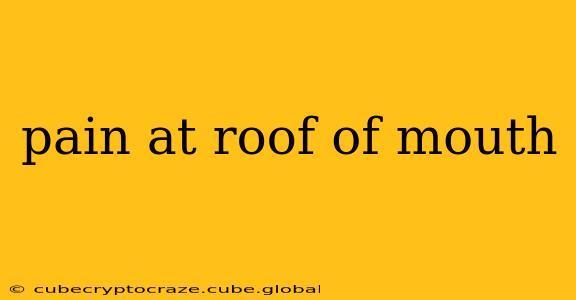Pain at the roof of your mouth, also known as the palate, can be a bothersome and sometimes alarming symptom. It can range from a mild ache to a sharp, stabbing pain, and its cause can vary widely. Understanding the potential reasons behind this discomfort is crucial for effective management and treatment. This comprehensive guide will explore the various causes, accompanying symptoms, and treatment options for pain on the roof of your mouth.
What Causes Pain on the Roof of My Mouth?
The causes of palate pain are diverse, ranging from minor irritations to more serious underlying conditions. Here are some of the most common culprits:
-
Oral Thrush (Candidiasis): A fungal infection caused by an overgrowth of Candida yeast, oral thrush manifests as white patches or creamy film on the tongue, gums, and palate. It often causes burning, pain, and soreness.
-
Canker Sores (Aphthous Ulcers): These small, painful ulcers typically appear inside the mouth, including on the roof of the mouth. They can range in size and often heal within a week or two. The exact cause is unknown but may be linked to stress, hormonal changes, or nutritional deficiencies.
-
Cold Sores (Herpes Simplex Virus): While cold sores usually appear on the lips, they can sometimes occur on the palate. These blisters are caused by the herpes simplex virus and are highly contagious.
-
Dry Mouth (Xerostomia): Insufficient saliva production can lead to a dry, uncomfortable feeling on the roof of your mouth, potentially causing pain or burning sensations. This is often a side effect of medications, certain medical conditions, or dehydration.
-
Mouth Injuries: Accidental burns from hot food or drinks, injuries from sharp objects (like dental work or accidentally biting your palate), or trauma can cause significant pain.
-
Allergies: Allergic reactions to certain foods or substances can cause inflammation and pain in the mouth, including the palate.
-
Dental Problems: Issues like ill-fitting dentures, gum disease (gingivitis or periodontitis), or impacted wisdom teeth can indirectly cause referred pain to the roof of your mouth.
-
Cancer (Rare): In rare cases, persistent pain on the roof of the mouth could be a sign of oral cancer. However, this is usually accompanied by other symptoms like lumps, sores that don't heal, bleeding, or numbness.
What are the Symptoms Associated with Palate Pain?
The symptoms associated with palate pain vary depending on the underlying cause. However, some common symptoms include:
- Sharp, stabbing pain: Often indicative of a canker sore or injury.
- Burning sensation: May suggest oral thrush or dry mouth.
- Soreness: A general discomfort and tenderness to the touch.
- White patches or lesions: Characteristic of oral thrush.
- Blisters or sores: Associated with cold sores or canker sores.
- Difficulty swallowing or chewing: May indicate a more severe underlying condition.
- Swelling: Could be a symptom of an allergic reaction or infection.
- Bleeding: A serious symptom that requires immediate medical attention.
How is Pain on the Roof of My Mouth Treated?
Treatment for palate pain depends heavily on the underlying cause. Here's a brief overview:
- Oral Thrush: Antifungal medications (usually topical) are prescribed to combat the fungal infection.
- Canker Sores: Over-the-counter pain relievers, mouthwashes, and topical creams can provide relief.
- Cold Sores: Antiviral medications can shorten the duration of the outbreak.
- Dry Mouth: Increasing fluid intake, using saliva substitutes, and addressing any underlying medical conditions can help.
- Mouth Injuries: Gentle cleaning, over-the-counter pain relievers, and avoiding irritants are generally sufficient.
- Allergies: Identifying and avoiding the allergen is key. Antihistamines may provide relief.
- Dental Problems: Requires professional dental care to address the underlying issue.
- Cancer: Requires immediate medical attention and specialized cancer treatment.
How Long Does Roof of Mouth Pain Last?
The duration of palate pain varies significantly depending on the cause. Minor irritations like minor injuries or canker sores might resolve within a few days to a couple of weeks. However, infections like oral thrush or more serious conditions may require longer treatment periods. Persistent or worsening pain should always prompt a visit to a medical professional.
When Should I See a Doctor About Roof of Mouth Pain?
You should consult a doctor or dentist if:
- The pain is severe or persistent (lasting more than two weeks).
- You experience swelling, bleeding, or difficulty swallowing.
- You notice any unusual lumps, sores, or lesions that don't heal.
- The pain is accompanied by fever or other systemic symptoms.
- You suspect an underlying medical condition.
This information is for general knowledge and does not constitute medical advice. Always consult a healthcare professional for diagnosis and treatment of any medical condition. Early intervention is key to effective management and resolving palate pain.
